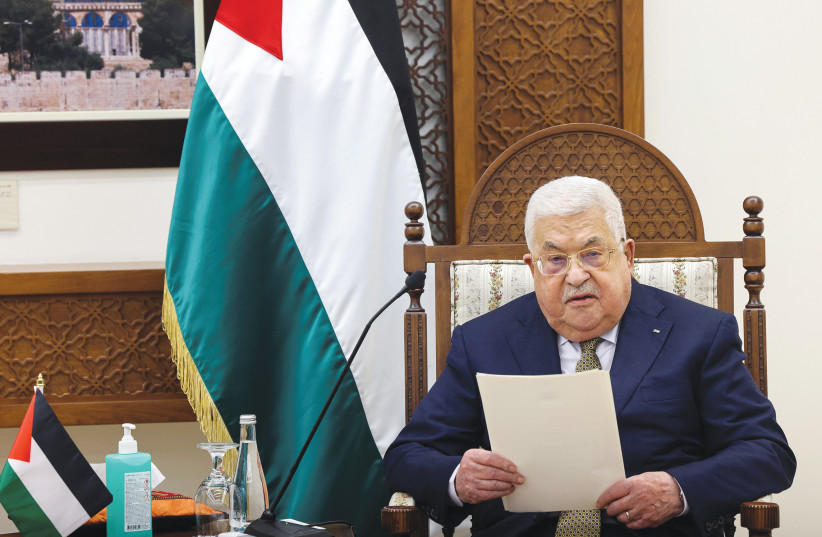The Palestinian Authority is seeking to revive an initiative for the formation of a national unity government consisting of several factions, including Hamas and Palestinian Islamic Jihad, Palestinian officials in Ramallah said over the weekend.
The proposal, the officials said, will be presented to leaders of Palestinian factions who have been invited to a meeting in the Egyptian capital of Cairo at the end of July. In addition to Hamas and Palestinian Islamic Jihad, the leaders of the Popular Front for the Liberation of Palestine (PFLP) and Democratic Front for the Liberation of Palestine (DFLP) have also been invited to participate in the meeting. All four groups are strongly opposed to the Oslo Accords and any form of normalization with Israel. They have also repeatedly called on the PA leadership to sever all relations with Israel.
The first Palestinian unity government, formed in 2007, was headed by Hamas leader Ismail Haniyeh, who was fired by PA President Mahmoud Abbas in June of the same year. A month later, Hamas staged a coup against the PA and seized control of the entire Gaza Strip.
In 2014, another unity government called the National Consensus Government, was established after the ruling Fatah faction and Hamas reached a reconciliation agreement to end their rivalry. The government remained in power until 2019, when former PA Prime Minister Rami Hamdallah was replaced with Mohammad Shtayyeh.

Abbas called for a meeting in Egypt
Abbas called the meeting in Cairo during the Israeli military operation in Jenin earlier this month, citing the need for reaching agreement on “a comprehensive national vision” to confront Israel. The upcoming meeting has been coordinated with the Egyptians, who support Abbas’s effort to form a unity government.
A senior Fatah official claimed the Egyptians have exerted pressure on Hamas and Palestinian Islamic Jihad to accept Abbas’s invitation to hold the meeting in Cairo. “If the Egyptians put enough pressure on Hamas, it’s possible we could see a new unity government,” the official said.
Azzam al-Ahmed, member of the Fatah Central Committee who previously played a major role in efforts to end the Fatah-Hamas dispute, told the Russian Sputnik media outlet that the proposed unity government would work towards ending the split between the West Bank and the Gaza Strip.
Ahmed confirmed that one of the goals of the meeting was to discuss the formation of a unity government that would adhere to the policies of the Palestine Liberation Organization (PLO), which signed the Oslo Accords with Israel in 1993, as well as international resolutions pertaining to the Israeli-Arab conflict. In the past, Hamas leaders rejected similar demands out of fear that such a move would be seen as recognition of Israel and the Oslo Accords. They have also challenged the PLO’s claim to being the “sole legitimate representative of the Palestinian people.”
Hamas and Palestinian Islamic Jihad, however, warned on Friday that the ongoing PA security crackdown on their members in the West Bank could foil the meeting in Cairo. They called on the PA to immediately halt the “political arrests.”
At least 53 Palestinians are being held in PA custody because of their political affiliation, according to Palestinian human rights activists, who pointed out that many of the detainees were members of Hamas and Palestinian Islamic Jihad. The activists said that since the beginning of the year, more than 150 Palestinians have been arrested by the PA security forces. They include political activists, journalists, university students and ex-prisoners who served time in Israeli prison for security-related offenses.
“The political arrests carried out by the Palestinian Authority have increased,” said Hamas spokesman Hossam Badran. “Some of the detainees were questioned about their political work and they were subjected to torture.”
Badran warned that the PA security crackdown would have “negative repercussions” on the planned Cairo meeting. “The [Palestinian] security forces must stop the political arrests and release all the detainees if they want President Mahmoud Abbas’s initiative [to form a unity government] to succeed.”
Palestinian Islamic Jihad issued a warning
Daoud Shehab, a spokesperson for Palestinian Islamic Jihad, the second largest terror group in the Gaza Strip after Hamas, also warned that the PA crackdown would sabotage the prospects of holding the meeting of the faction leaders in Cairo. “We don’t believe the Palestinian Authority will bring anything new to the meeting,” Shehab said. “The crackdown shows that the Palestinian Authority is determined to continue the security coordination [with Israel]. How will we all meet and look each other in the eyes while the [Palestinian] security forces are arresting our cadres?”
Talal Dweikat, spokesman for the PA security forces in the West Bank, denied claims by Hamas and Palestinian Islamic Jihad that Palestinians were being arrested because of their political affiliations. Dweikat claimed that the PA security forces were only acting against those who break the law and public oder “to maintain civic peace.” He lashed out at Hamas for making the allegations against the PA. “It would have been better for Hamas to talk about national unity and the formation of a unity government that would administer both the Gaza Strip and the West Bank,” he said.
Palestinian journalist and political activist Akil Awawdeh, who posted a video on social media ridiculing Dweikat’s remarks, was immediately arrested by the PA’s Preventive Security Service in Ramallah. The arrest triggered a wave of protests by Palestinian journalists and human rights advocates, who accused the PA leadership of seeking to silence and intimidate its critics.
